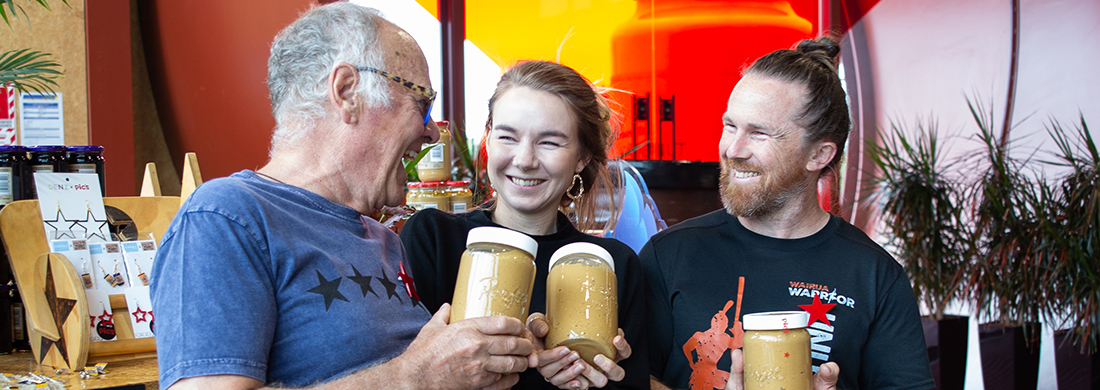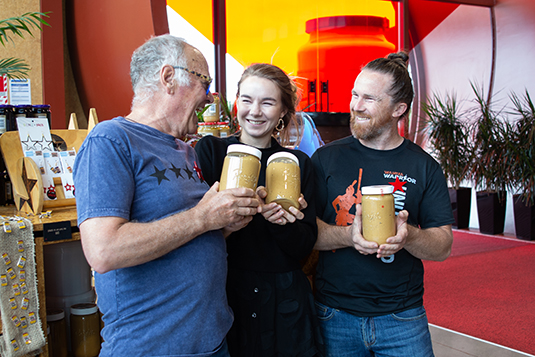
Glass heroes – From roasting peanuts in a concrete mixer to leading the way

Nelson-based peanut butter specialist and Glass Packaging Forum members Pic’s Peanut Butter has one of those great Kiwi can-do origin stories, a philosophy based on community, and some enviable sustainability chops to boot. From selling refillable peanut butter jars at the local market to having an international presence, being Climate Positive and diversifying into a Nelson tourist attraction, the story of Pic’s is a fascinating one. We chatted to Head of Marketing Caitlin Attenburrow and Head of Operations Heath Bowman to find out more.
Pic’s has a great story behind it. Tell us a bit more.
About 15 years ago Pic (Picot) was eating some ‘health style’ peanut butter and saw on the label that it had sugar in. He rang up the company and asked how they can sell peanut butter with sugar in it and call it ‘health style’?
The company explained it was what the consumer wants. Pic didn’t believe this was right, so he bought some peanuts, roasted them, ground them up in his blender – which he blew up in the process – and added some salt.
At first Pic just made it for his friends and family but one day a boy asked to buy some of his peanut butter, and he had a light-bulb moment that there could be something to this peanut butter thing. He first started selling at the Nelson Farmers’ Market, roasting peanuts in a concrete mixer with a gas burner under it.
That’s how it started and we’ve kept a very similar philosophy of roasting our own peanuts and making our peanut butter with just peanuts and salt to this day.
Where did Pic see the business going in the early days?
At the time Pic had a launderette down at the port, but he has macular degeneration which means he’s nearly blind, so he was having to step back from the launderette. He thought that if the peanut butter business could make at least the same as what the launderette was earning he’d be OK – that’s all he really set out to do.
People really loved the peanut butter and kept coming back so he took the plunge and put in his retirement savings to get the first factory going. He set it up in the old meat works in Nelson, hired a few employees – three of which are still with us – but quickly outgrew that factory, so in 2012 built a new one just down the road.
Not long after we added extra shifts and commissioned an extra factory down the street and eventually built Peanut Butter World, now we have everything on one site.
You use glass for a lot of your products. Why is that?
We use a mixture of glass and plastic jars here at Pic’s. We use glass for our 380g jars and 1kg refillable Perfit jars, which we use for our return scheme. We like that glass is infinitely recyclable and is really good for reuse too.
The business has a real point of difference with Peanut Butter World and its tours. Tell us more about it.
In February 2019 we had a big opening for the public and had around 5,000 people through that first day – it was incredible. We had tours at the old factories, but they weren’t anything like they are now.
Pic always says he would rather have an in-depth conversation with one person than put up a big billboard. With that comes a lot of transparency. For example, in the early days he would put the recipe for making the peanut butter on the back of the jar.
Taking people on that journey; showing them how important roasting is, how simple the ingredients are, and the history of Pic’s is how we market ourselves – it’s very personal, which people really connect with.
We don’t think of ourselves as a tourist attraction, but we are actually a Qualmark Gold-accredited tourist attraction.
Pic’s is still sold at the Nelson Market, is that something of a nod to the company’s origins?
That’s right and it’s a way to keep in contact with the Nelson shoppers who supported us from day one.
It’s also where we do the bulk of our 1kg jar returns. The returns have been running since Pic started but the jars have changed so we can sterilise them more easily to meet food safety requirements. It’s not a refill on site system, but customers get a credit when they return the jar.
Some jars come back with chips and cracks so we recycle them and put new ones in here and there and we currently we get about a 65% return rate for refill. There is a bit of volume in it but it’s local only with some local shops selling them.
We would love to scale it up but the logistics of returning dirty glass jars halfway across the country doesn’t stack up. It’s not just the weight of the empty jars but the fact you are putting dirty jars into cardboard boxes because you would need new boxes for the clean jars – it becomes unsustainable.
What we would like to do to improve the system is make the containers refillable on site by the customer. It’s a project we may look at over the next year or so.
What does the future hold for Pic’s?
Pic is really interested in how we can make the business better for the next generation. He’s had this amazing phase of growth but now he’s really focused on how we can be a good company for the planet and leave a good legacy.
We started measuring our carbon emissions a few years ago and were certified Climate Positive for the first time in 2020 by local social enterprise EKOS. This means we offset the emissions we can’t reduce to 120%, so we are drawing carbon out of the atmosphere by running our business.
We also focus on reducing our carbon emissions over time, and in our second year of measurement we reduced them by 13% year-on-year.
To encourage other businesses to become Zero Carbon and Climate Positive, we have also teamed up with our local business community in Te Tauihu. We are part of a group that our friends down the road at Chia Sisters started, ‘Businesses for Climate Action’ with a mission to lead the Top of the South to be Zero Carbon.
We’re started trialling peanut growing, in 2020, in Northland in partnership with the Ministry for Primary Industries Sustainable Food and Fibre Futures and The New Zealand Institute for Plant and Food Research. We’re trialling three locations – Ruawai on a kumara farm, Pouto Peninsula near Dargaville, and in the Kai Iwi Lakes district.
If successful, peanut farming could bring new employment opportunities to the Northland region, alongside potentially making a very real difference to our carbon footprint. Wouldn’t it be great if one day we could make a New Zealand grown peanut butter?
The main thing for us going forward is not just having growth but sustainable growth across our three priority markets, New Zealand, Australia and China.


